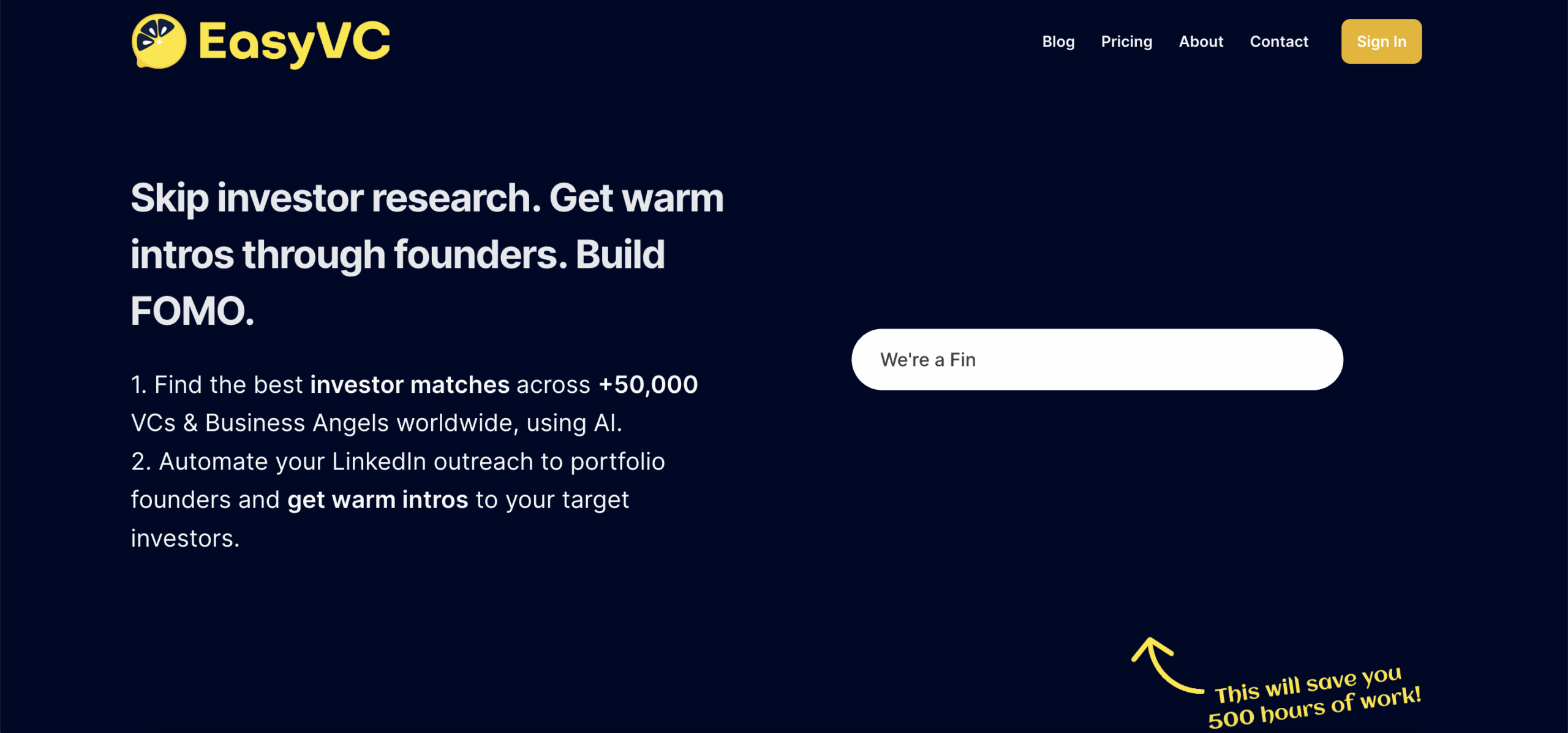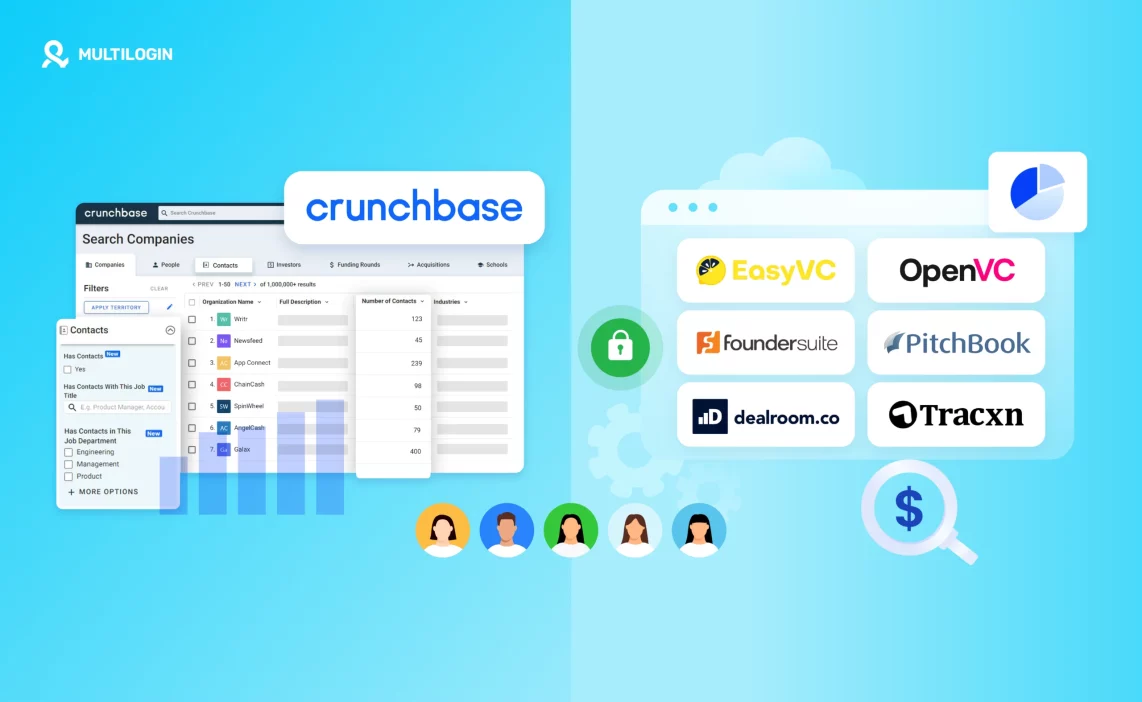Crunchbase is one of the most popular platforms for startup data and funding intelligence. But it’s not perfect. Limited exports, expensive pricing tiers, and surface-level info outside North America push many users to search for better tools, or tools that help them actually act on that data, like managing multiple outreach accounts or running safe prospecting campaigns.
In this guide, we’ve curated the best Crunchbase alternatives, some offer richer data, others focus on CRM integration, and a few give you the power to act on that data with scale and safety.
Whether you’re in sales, research, or lead gen, there’s a tool below that fits your workflow.
What is Crunchbase?
Crunchbase is a business information platform that tracks companies, investors, funding rounds, and industry trends. It’s mainly used by founders, investors, and sales teams to find startup data, discover funding history, and identify growth signals.
The platform lists millions of companies and investors from around the world. You can search by industry, funding stage, location, and more. Many use it to build lead lists, study competitors, or follow investor activity.
Crunchbase offers a free version with limited access. Paid plans unlock advanced filters, exports, and CRM integrations like Salesforce and HubSpot.
In short, if you want to research startups or find potential investors, Crunchbase is one of the most widely used tools on the market.
Why you need Crunchbase alternatives
Crunchbase is useful, but it doesn’t cover everything. Its data can be limited, especially outside the U.S., and key features like exports or contact details are locked behind paywalls. If you’re working on a budget, need better lead tracking, or want tools built for your region or workflow, it makes sense to look elsewhere. A good alternative can save you time, give you deeper insights, or fit your process better—without the extra cost.
Best Crunchbase alternatives
Crunchbase is popular, but it’s not always the right fit. Many teams look for tools with more flexibility, better data access, or features that match their workflow. Now let’s review the best Crunchbase alternatives:
1. Easy VC – AI-Powered investor discovery tool

If you’re tired of manual investor research, Easy VC gives you a faster way to find the right match. It’s an AI-powered database with over 50,000 venture capitalists and angel investors, complete with details like investment focus, ticket size, and verified contact emails.
What makes it useful is how it goes beyond static lists. You can search by investor name, stage, industry, or ticket size—then launch warm intro campaigns through LinkedIn using their Chrome extension, and it shows you the LinkedIn profiles of portfolio founders.
For capital raising, Easy VC makes your outreach way easier. You can track views on your pitch deck, get notified when investors read it, and protect sensitive info with screenshot locks and watermarks. That means you waste less time on cold leads and focus more on people who are interested.
Pricing starts at $0. There’s a free plan (donations welcome), or you can upgrade to $119/month, or $89/month if billed annually.
Best for: Early-stage founders, solo operators, or small teams who want a direct, AI-assisted way to find and contact investors, without paying for enterprise tools.
2. Foundersuite – Crunchbase alternative with investor CRM

Foundersuite is built for one thing: managing your fundraising from start to close. It combines a CRM, email tools, and a database of over 250,000 investors, all in one place.
You can build your investor pipeline with Kanban-style boards, send mail-merged emails, and keep track of every intro, meeting, or follow-up. It also comes with templates for investor updates and a lightweight data room to share documents securely.
It’s not perfect. The investor data leans heavily toward U.S.-based funds, and it doesn’t offer deep financial info or advanced analytics. The interface also feels a bit dated.
Still, for founders who want to stay organized during a raise, it’s a practical option.
Pricing starts at $44/month, with a free tier available for smaller outreach efforts.
Best for: Startups in early-stage fundraising looking for a simple CRM to manage investor outreach and updates.
3. Dealroom – Market intelligence focused on Europe

If you’re targeting the European tech scene, Dealroom is one of the most data-rich platforms that you can use. It’s trusted by governments, accelerators, and corporates to map startups, track funding, and benchmark ecosystems across the EU.
You get access to over 2 million companies and 200,000 investors, with tools like heat maps, valuation tracking, and talent metrics. Public city dashboards (like Amsterdam and Berlin) offer hyper-local insights, while the API and BI exports support deeper research.
The downside? U.S. and Asian data is limited unless you’re on a higher-tier plan, and pricing details aren’t clear until you speak with sales.
Best for: Teams focused on European startups, ecosystem analysis, or city-level investment data.
Pricing: Free community plan available. Paid plans start around €6,000 per year for professional access.
4. OpenVC – Free, community-driven investor database
OpenVC is a no-cost, founder-friendly alternative to Crunchbase. It gives you access to over 9,000 investors, each with details like investment stage, ticket size, location, and how to get in touch.
The standout feature is the “Send your deck” workflow—a standardized form that skips cold emails and sends your pitch directly to VCs who’ve opted in. You can also track submissions, request warm intros, and access a public API (currently in beta).
It’s simple and open, but not perfect. The data depends on community updates, and there’s no built-in CRM or lead enrichment.
Best for: Early-stage founders who want a free and direct way to contact investors.
Pricing: 100% free for both founders and investors.
5. Tracxn – AI-Driven startup signals across 300+ sectors

Tracxn helps you discover early-stage startups with the help of AI and human analysts. Covering over 1.4 million companies, it tracks emerging trends, niche markets, and sector momentum—making it a go-to for corporate innovation teams and VCs.
You get access to sector scorecards, market maps, Chrome extensions, and real-time Slack alerts. If you need deeper insight, you can even book analyst calls directly through the platform.
However, the platform leans heavily on Asian and India-based data, and it doesn’t include a CRM or workflow tools out of the box.
Best for: Research teams or large firms scouting startups in specific niches or emerging sectors.
Pricing: Custom plans starting around $8,000/year.
6. PitchBook – Deep financial data for private and public markets

PitchBook is built for serious research. It offers detailed data on 3.5 million companies and nearly 2 million deals, covering everything from private equity and venture rounds to fund performance and cap tables.
Its strength lies in verified analyst research, along with tools like an Excel plugin and Salesforce integration. You can pull financials, valuations, and comparables directly into your workflow, and even submit questions to PitchBook’s analyst team.
That said, it’s built for professionals. The interface can feel overwhelming, and pricing starts at $12,000 per seat per year, making it more suited for corporates, PE firms, and investment banks than solo founders.
Best for: Advanced users who need deep financials and deal-level insights across private and public markets.
Pricing: Starts at $12,000/year per user, with annual contracts.
You found the leads, now here’s how to reach them
Crunchbase and its alternatives help you discover the right companies, investors, and decision-makers. But finding leads is only the first step. The real challenge begins when you start reaching out — especially from multiple accounts, regions, or devices. That’s where platforms tighten their rules, flag unusual behavior, or shut accounts down altogether.
This is exactly where Multilogin becomes essential.
Multilogin gives you the infrastructure to act on your research safely. If you’re running outbound campaigns, testing messaging across locations, or managing several online identities at once, Multilogin keeps everything stable, separate, and undetected. You get clean profiles, unique fingerprints, and built-in residential IPs — all without juggling risky setups or extra tools.
Why sales teams, growth marketers, and founders rely on Multilogin:
Run multiple accounts safely
Manage LinkedIn, Gmail, ad accounts, outreach platforms, and more in isolated browser profiles that behave like real users.
Stay undetectable with real-world fingerprints
Every profile gets a unique, customizable fingerprint (55+ parameters) plus a dedicated IP. No overlaps, no shared signals, no bans.
Act faster with pre-warmed profiles
Profiles come with aged cookies that help builds trust on platforms, cutting down verification loops and early blocks.
Work at scale with automation tools you already use
Multilogin integrates with Selenium, Playwright, Puppeteer, and the Multilogin CLI so you can automate outreach, scraping, onboarding, or repetitive tasks.
Built-in residential proxies — no extra providers needed
Every subscription includes premium proxy traffic. No separate purchases, no risky mismatched setups, no hidden fees.
Stable performance for heavy workloads
Whether you’re running dozens of accounts or switching between tasks all day, Multilogin keeps sessions steady through the Multilogin X app (desktop) launcher and synced cloud profiles.
Team-ready from day one
Invite teammates, control permissions, share profiles, and run bulk actions without exposing sensitive data.
Real support when things get busy
24/7 expert help in five languages, plus guided onboarding for teams that need fast setup.
Start your 3-day trial for only €1.99.
No risk, full access.
FAQs about Crunchbase Alternatives
The best Crunchbase alternatives in 2026 include tools like Easy VC, Foundersuite, Dealroom, OpenVC, Tracxn, and PitchBook. Each one serves a specific use case—whether you need investor data, CRM integration, market research, or AI-curated startup tracking.
Users look for Crunchbase alternatives because Crunchbase can be expensive, limited in non-U.S. data, and lacks certain features like deep financials or built-in outreach tools. Alternatives offer better regional data, flexible pricing, and CRM or lead management features.
Yes, Crunchbase alternatives can support outbound sales by offering investor contacts, lead data, and CRM tools. But once the outreach begins, tools like Multilogin become essential for managing multiple accounts and staying undetected during campaigns.
Yes, OpenVC is a free Crunchbase alternative. It offers a community-maintained investor database where founders can submit their pitch decks directly, without needing a paid plan or expensive filters.
Multilogin fits with Crunchbase alternatives by helping you act on the data safely. After building lead lists using platforms like PitchBook or Easy VC, Multilogin lets you manage multiple accounts, automate outreach, and avoid bans, making it a key tool for execution at scale.
Conclusion
If you’re looking into Crunchbase alternatives, it’s not only about getting more data—it’s about using the right tools that match how you actually work. Whether you’re researching investors, building lead lists, or tracking startup activity, the tools in this list each solve a different part of that process. But once you’re ready to take action—send messages, test funnels, or run outreach across accounts—you’ll need more than just data. That’s where Multilogin helps. It provides a safe and reliable way to operate at scale, avoiding blocks or flags.


